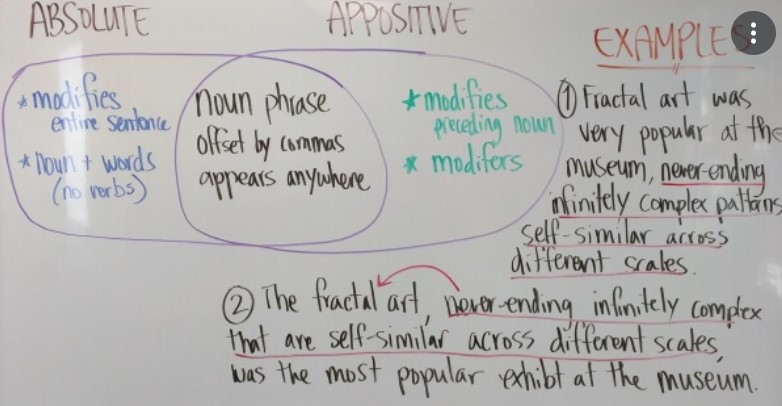An expression is a gathering of words that come up short regarding a matter, a predicate (action word), or both. The English language is brimming with them: under his watch, the apple trees bloomed, finishing the football season. With yahi trail, salmon opening. above. (For additional, see the TIP Sheet “Relational words and Prepositional Phrases.” But different sorts of expressions likewise advance the English language: verbal, agreed, and complete expressions. You should know the answer to what is an appositive phrase?
1. Verbal Action Words Resemble The Other The Same.
It would appear that a verbal action word however doesn’t behave like an action word. In the accompanying sentences, intensifiers are utilized as some different options from action words:
- Climbing El Capitan was not feasible. (thing and subject of the sentence)
- A deafening commendation rose to his feet. (Descriptor)
- I disdain frozen peas. (Descriptor)
- He needs to examine agrarian science. (thing and direct article).
- There are three kinds of syllables:
- “Ing” words (- ing structures that capacity as things)
- Participle (Present or past participle action word shapes that go about as descriptors)
“Ing” Word Phrases Are Things.
An “ing” word is a – ing action word structure that really capacities as a thing. Any action word utilized in the predicate (part of the action word) of a sentence should be joined by an assistant action word, for example, is, was, or has been; A “ing” word comes up short on this extra. Did you know, what is the DCP full form? Therefore, an “ing” word can never work as an action word, yet it can do anything that another thing can. For instance, the accompanying “ing” word express is the subject of the sentence:
- Exploring Little Yosemite Valley was remarkable.
- This single word “ing” word is the immediate object of an action word:
- As we climbed Half Dome, Tom clarified the rappelling.
“Ing” words can be bilarta subsequent to forming action words (Attention! The sentence beneath is the action word, was not staggering. The actual experience was not staggering! The most loved experience was our demonstration of staggering.):
- Our number one experience was coincidentally finding a frog lake somewhere down in the forest.
- The accompanying “ing” word state is the object of a relational word:
- We were stressed over getting cleared over the cascade while swimming.
Participial Expressions Are Descriptors.
Participial action words – words or expressions – are descriptors. They resemble the current participle (- ing) or the previous participle (- ed or – en) action word structures. A previous participle utilized in the predicate of a sentence should be joined by an assistant action word, for example, is, was, or alternately is; Participial or participle expresses that capacity as descriptors come up short on this helper. The accompanying participial expression portrays the thing bear:
Infinitive Expressions Are Things, Modifiers, Or Qualifiers.
An infinitive is the essential, or basic, type of an action word that went before by to expect, to assign, to consider. (Since a typical relational word, infinitives are regularly confused with prepositional expressions, which they are not. For more data, see the TIP Sheet “Prepositional and Prepositional Phrases”.) Infinitives with their + action word designs are not difficult to perceive Is. They can assume many parts in a sentence – thing, modifier, or qualifier.
- In the accompanying models, infinitive expressions are utilized as things—for this situation the subject and direct item, separately:
- It was excruciating to see the bear being tossed to a great extent.
- We attempted to provoke our companions at Half Dome with an instant message, yet were ineffective.
Then again, the accompanying infinitive expression is utilized as a descriptive word to adjust plans:
- When we lost our food supply, our arrangements to forge ahead Tuolumne Meadows unexpectedly changed.
- Coming up next is a modifier expression changing the infinitive action word (the intensifier addresses the inquiries when, where, how, and why):
- In the future, to forestall the deficiency of our food store, we’ll use bear canisters all things considered.
2. Positive Expressions Are Things.
- The positive is a thing expression that renames or replaces a previous thing or pronoun:
- A solid fragrance, the apple trees in blossom, coursed through the open window.
- Agreed expressions are quite often interspersed by commas as the essential components of a sentence. One special case is the certifiable of a word, where commas are superfluous.
- My sibling Joseph understands six or seven sites every day.
3. Total Phrases Modify Absolutely Everything
In contrast to different modifiers, total expressions don’t alter a specific word in a sentence; Rather, they change the entire sentence – laying everything out or the foundation in general, in a manner of speaking. An absolutist expression generally comprises of a thing (or pronoun) and a participle (see “participatory expression” above): umbrellas taking off noticeable all around, his expectations at last ran. In the accompanying models, note that absolutist expressions can’t consistently be said to adjust a specific expression of the primary condition:
- Umbrellas flying noticeable all around, understudies at the bus station He stowed away under the faint haven of information.
- Rodrigo, unfortunately, consents to abandon and sell his fantasy home, his expectations at long last ran for a compromise.
- Like appositives, supreme expressions are isolated from the remainder of the sentence by a comma.
